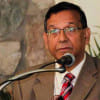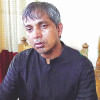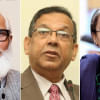Bring Wasa, Rajuk under DCCs
Mayor Annisul Huq wants Rajuk and Wasa under the jurisdiction of the city corporations to get rid of the city's waterlogging problem.
The mayor can do nothing to address the waterlogging as Wasa digs canals and maintains storm-water drainage system, the Dhaka North City Corporation (DNCC) mayor said yesterday at a programme organised by Bangladesh University.
Since assuming offices, the mayors of DSCC and DNCC have been facing problems in providing Dhaka dwellers with quality service as they have no control over more than four dozen organisations providing services in the capital.
They have no control over Dhaka Metropolitan Police, Wasa, Rajuk and the authorities that supply power, and gas. These single-purpose organisations serve the city but are under different ministries.
“If Wasa's canal digging department is brought under the mayors' jurisdiction effectively, then it will be fruitful and waterlogging problems will be solved in two years,” Annisul said.
He demanded both Water Supply and Sewerage Authority (Wasa) and Rajdhani Unnayan Kartripakkha (Rajuk) entirely or partly be under the jurisdiction of the mayors' offices.
His frustration stems from his experience in the last 8 months. The DNCC mayor yesterday gave instances of how they were facing difficulties in doing their job.
Highlighting the lack of coordination affecting service quality, he said whenever the city goes under rainwater, the blame game begins. “It is very difficult to work,” he said.
In the matter of city governance, the mayors are hapless as they are unable to make a master plan and take measures.
At a programme of Rajuk in September last year, DSCC Mayor Mohammad Sayeed Khokon expressed his frustration as “the authority designed a 20-year master plan of the capital without consulting his office”.
At another programme on last November 19, Khokon said, “We are guardians of roads. We repair roads. Vehicles ply on our roads. But the BRTA pockets all the revenue.”
Dhaka's first elected mayor in 1994, Mohammad Hanif, Khokon's father, had first proposed a metropolitan government to improve city governance and services.
Bangladesh University organised the programme yesterday to unveil the results of three researches conducted on how to make Dhaka a better place to live in.
Member of the board of trustee of Bangladesh University Iqbal Habib in a presentation showed how water routes could be created alongside streets by reviving Narail, Rampura, Dholaikhal, Panthapath, and Kalyanpur canals.
In reply to a question of the mayor, Habib said waterways would not narrow existing roads as “many buildings are erected illegally on those roads”.
Another research result shows that average noise level at the capital's Sankar, Agargaon, Mohammadpur, Farmgate, Shyamoli, and Tejgaon was higher than the tolerable level of 70 decibels. Among the areas, the highest average was in Tejgaon area, 139dB and the lowest in Mohammadpur area, 83dB.
Their research also found that particles were alarmingly high in the air of Dhaka.
Their third research was on the benefits of making nine important points under DNCC illegal for parking and building a 60-feet-wide street from Mohammadpur to Basila.
Quoting their preliminary findings, Habib said their research suggested that over Tk 1,000 crore would be saved every year if the nine places were made illegal to park.

 For all latest news, follow The Daily Star's Google News channel.
For all latest news, follow The Daily Star's Google News channel. 







Comments